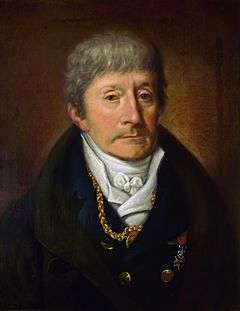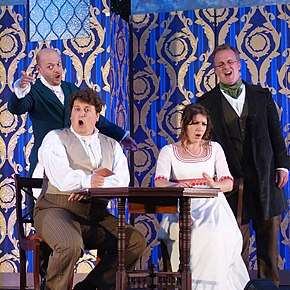La scuola de' gelosi
La scuola de' gelosi (The School of Jealousy)[1] is a dramma giocoso in two acts by Antonio Salieri, set to a libretto by Caterino Mazzolà.
| Antonio Salieri |
|---|
 |
|
Operas
|
Performance history
It was first performed at the Teatro San Moisè in Venice on 27 December 1778.[2] In 1783 it was given at the Burgtheater in Vienna to inaugurate the reestablishment of the Italian opera troupe. Salieri revised the score for the 1783 performances, creating new arias and expanding the role of woodwinds and brass in the scoring of the work. The cast included Francesco Benucci as Blasio and Nancy Storace as the countess, the original Figaro and Susanna in Mozart's The Marriage of Figaro. It reached London in 1786, where, as in many other European cities, it enjoyed great success. Joseph Haydn composed two insertion arias for the work, one lost, the surviving aria, "Dice benissimo", for the bass role Lumaca and orchestra, H. 24b/5.
Among the many admirers of the opera was Johann Wolfgang von Goethe, who wrote to Charlotte von Stein in a letter dated 28 August 1784:
Yesterday’s opera was charming, and well executed, it was the Scuola de Gelosi, Music by Salieri, opera favourite of the public, and the public is right. There is an astonishing richness, variety, and everything is treated with a very delicate taste. My heart was moved by every tune, especially the finales and quintets which are admirable.[a 1]
On 28 August 1784, Goethe was in Brunswick.[3][4] A production of the opera there in 1782 has been recorded.[5]
A production opened in Legnano, Italy (Salieri’s birthplace) late in 2016 and subsequently toured to Jesi and Florence. A further new production created by the Theater an der Wien opened at the Kammeropera, Vienna in May 2017[6][7] and transferred to Cologne in 2019.[8] Bampton Classical Opera presented the UK modern times première in 2017.[9]

The North and South American première was given in 2017 in Montevideo by Ópera Joven ('Youth Opera') of Uruguay, in a co-production with Sodre, the public broadcasting organisation of Uruguay.[10] A video of the production is available on youtube.[11]
Roles
| Cast | Voice type | Premiere, 27 December 1778 (Conductor: – ) |
|---|---|---|
| Count Bandiera | tenor | |
| Countess Bandiera | soprano | |
| Blasio, a grain dealer | bass | |
| Ernestina, his wife | soprano | |
| Lumaca, Blasio's servant | bass | |
| Carlotta, a chambermaid | soprano | |
| The Lieutenant, Blasio's cousin and a friend of the count | tenor |
Synopsis
The plot of the opera involves love intrigues, attempted seductions and provocations to jealousy between members of the three different social strata: the aristocracy, the bourgeoisie and the working class. The role of the Lieutenant is a close parallel to that of Don Alfonso in Mozart's Così fan tutte.
Recordings
Salieri: La scuola de' gelosi, Emiliano d'Aguanno, Francesca Lombardi Mazzulli, Federico Sacchi, Roberta Mameli, Florian Gotz, Milena Storti, Patrick Vogel; L`arte del mondo, Werner Ehrhardt DHM 2016[12]
Notes
- "L’Opera d’hier etoit charmant, et bien executé, c’etoit la Scuola de Gelosi, Musique de Salieri, opera favori du public, et le public a raison. Il y a une richesse, une varieté etonnantes, et le tout est traité avec un gout tres delicat. Mon coeur t’appelloit a chaque air, surtout au finales et au quintets qui sont admirables." Goethes Briefe an Frau Von Stein, edited Adolf Schöll and Wilhelm Fielick, Literarische Anhalt, Frankfurt am Main, 1885, p211
References
- Elena Biggi Parodi, "Catalogo tematico delle opere teatrali di Antonio Salieri", Lim, Lucca 2005, p. CLVIII, 957.
- Elena Biggi Parodi, "La fortuna della musica di Salieri in Italia ai tempi di Mozart" in Da Beaumarcais a Da Ponte, ed. Elena Biggi Parodi and Rudolph Angermüller, Torino, 1996, pp. 41–51.
- "Goethe, Johann Wolfgang - Briefe - 1784". Retrieved 2 June 2020.
- Tina Hartmann. Goethes Musiktheater: Singspiele, Opern, Festspiele, "Faust". p. 151. ISBN 9783111874142. Retrieved 2 June 2020.
- "Die Schule der Eifersüchtigen : eine scherzhafte musikalische Operette aufgeführt auf dem Fürstlichen kleinen Theater zu Braunschwei". Retrieved 2 June 2020.
- "Die Schule der Eifersucht La scuola de´gelosi". Theater an der Wien. Retrieved 3 June 2020.
- "La scuola de´gelosi Dramma giocoso in two acts". atelier christof cremer. Retrieved 3 June 2020.
- "„La scuola de' gelosi" Temporeicher Klamauk an der Kölner Oper". Retrieved 3 June 2020.
- Seymour, Claire (13 September 2017). "The School of Jealousy: Bampton Classical Opera bring Salieri to London". Opera Today. Retrieved 14 May 2020.
- "Ópera Joven. "La Scuola de' gelosi"". Retrieved 2 June 2020.
- https://www.youtube.com/watch?v=3qWPlVm-K5s
- "Salieri: La Scuola de' Gelosi CD review – spirit and poise from a much maligned musician". The Guardian. Retrieved 3 June 2020.
- Rice, John A.: "La scuola de' gelosi", Grove Music Online ed L. Macy (accessed 4 May 2007), grovemusic.com, subscription access.
- Rice, John A.: "La scuola de' gelosi" in The New Grove Dictionary of Opera, ed. Stanley Sadie (London, 1992) ISBN 0-333-73432-7